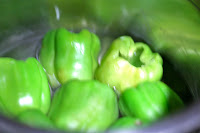Cooking with Be Light. Be Well.
On May 19th we had the
privilege of cooking with Nandini Gulati, founder of Be Light. Be
Well and Lifestyle Advisor for Sharan. Our cooking class lasted a few
hours, and by the end we were convinced that simply prepared fresh
vegetables were in fact delicious. The methods and preparation were
easy, focusing on drawing out the flavors of raw organic vegetables and
preparing recipes that actually didn't require much stove top action
at all.
Nandini's philosophy looks at food from
a holistic perspective. She looks at where it comes from, how it
grown, and how it is eaten. Nandini started off our class with a
brief presentation on the history of food. She talked about how food
has greatly deviated from it's natural state, as most products these
days have many ingredients that we cannot pronounce and are derived
from some chemical. We watched some film clips on fast food and
industrialized agriculture. At the end she also made a brilliant
statement that seemed to sum it all up: nowadays we treat organic
produce is something special when it's really chemically produced
fruits and vegetables that are unnatural. This phrase stuck with us
as we went to the next part of the class: cooking with fresh organic
vegetables.
Throughout the day Nandini had many
tips to offer us. As a vegan, she knew non-animal product based
alternatives for everything. Within a few hours we had whipped up a
meal of salads, steamed vegetables, and an incredible pumpkin halwa.
Yes, you read correctly, pumpkin halwa. Everything we made had 5 or
fewer ingredients. It was truly about enjoying the best of nature in
it's natural form. An important additional note: we used absolutely
no oils, and ate on whole grain breads/crackers. All of these recipes
can be found on sharan.com.
We started off with an incredibly
refreshing mint lemonade. Nandini doesn't used refined sugar, and
instead substituted palm sugar, which can be obtained pretty easily.
Next we made a cabbage salad with peanuts and a lemon-cilantro dressing.
Next we made a cabbage salad with peanuts and a lemon-cilantro dressing.
Then came a delicious cashew tomato
spread.
Afterwards we followed up with a
pumpkin salad.
Then a cucumber coconut peanut salad.
Steamed Bhindi with an incredible besan
filling.
Steamed karela served along side
steamed mashed potatoes.
Finally we finished off with the
pumpkin halwa.
Convinced yet? We all left seriously
considering switching to a raw food diet. And even if we end up not
converting, we learned a lot of great ways to prepare food that is
good for us in everyway. No refined ingredients, no oil. Just natural
goodness.










































